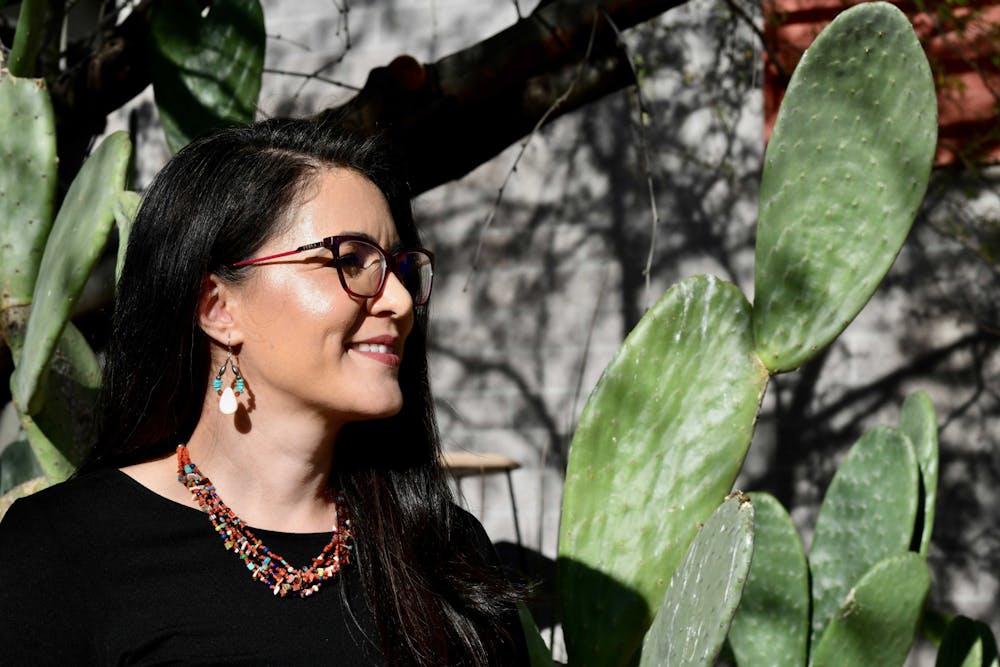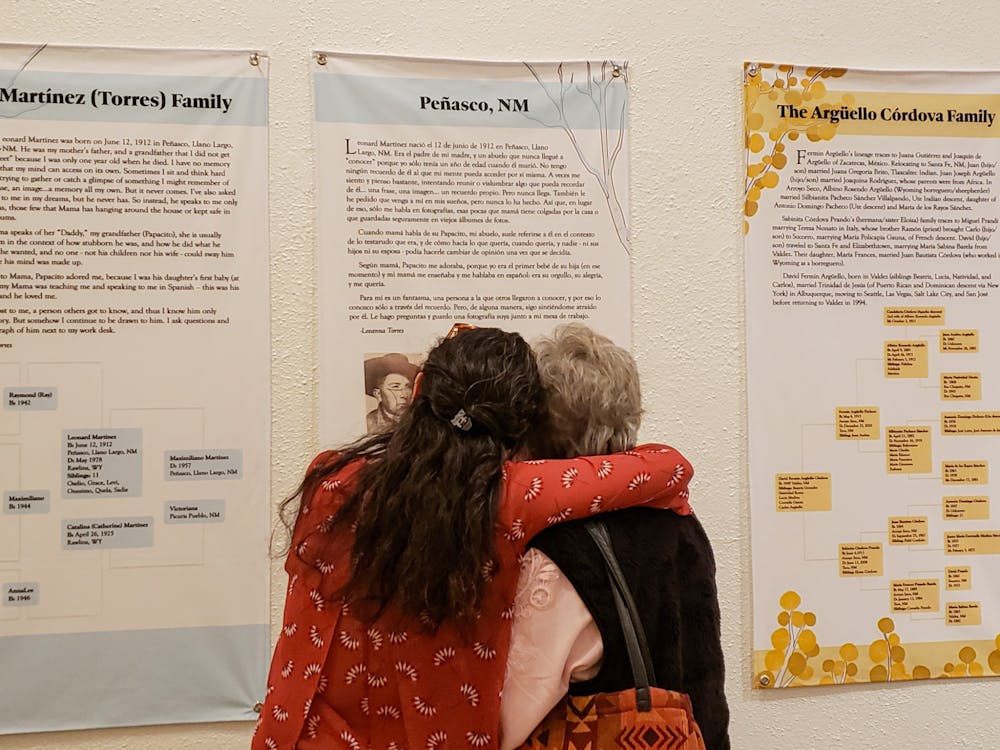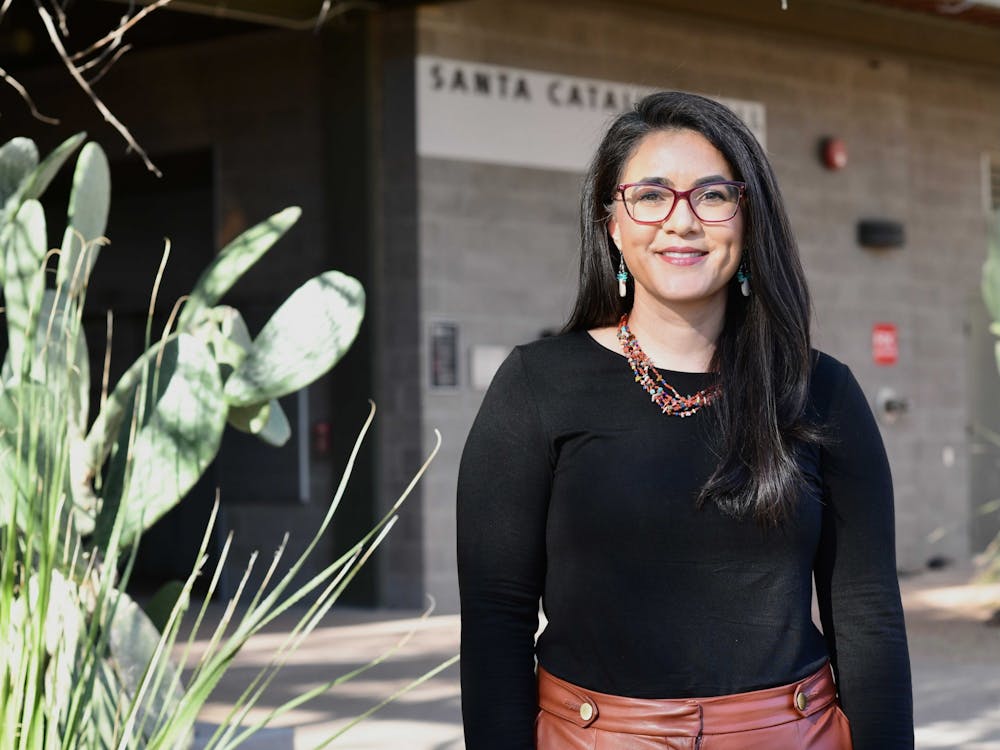When Vanessa Fonseca-Chávez took her first teaching job at the University of Wyoming in 2013, an unexpected encounter spurred a project dedicated to documenting family histories through recorded interviews that would grow for years to come.
"I ran into a woman at the ACE Hardware store in Laramie, Wyoming who looked like my aunt — like she could be my aunt," she remembered. "I ran into this woman and she mentioned that she was from New Mexico, and then I started wondering how many other people in Wyoming are from New Mexico. And there are a lot."
An associate professor of English and an associate dean of diversity, equity and inclusion, Fonseca-Chávez's work in academia is molded by her own life and desire to build community in spaces historically inaccessible to marginalized identities.
In the mid-19th century, a swath of New Mexican sheep herders moved to Wyoming. Fonseca-Chávez compiled lists of New Mexican expats she knew in Laramie before connecting with Levi Romero, the 2020 New Mexico Poet Laureate.
In 2007, Romero conducted a series of interviews with New Mexicans who had migrated to Wyoming. When Fonseca-Chávez inquired about the status of his project and urged him to "pick it up again."
In 2015, Fonseca-Chávez and Romero became co-directors of the Following the Manito Trail project. In time, other researchers joined the project, and Romero and academic Trisha Venisa-Alicia Martinez of the University of New Mexico-Taos expanded it to Fonseca-Chávez’s beloved home state. The project showed Fonseca-Chávez and her colleagues that the New Mexican diaspora is omnipresent.
Manito is derived from the Spanish words hermano and hermana and tends to be a term of endearment in central-to-northern New Mexico. Spanish as a gendered language and the presence of other communal terminology complicates the use of the term. "I think it's meant to really just embody a type of migration and culture more than it is a particular set of people who identify with that term," Fonseca-Chávez said.
Others view manito as a derogatory term white folks would weaponize against Hispanic laborers. The term's complexity presents new questions and conversations for Fonseca-Chávez and her peers to consider as they continue their work on the project.
"There's all these different pockets, and we keep learning more and more about them," she said of New Mexican families spread across the nation. The project has had numerous gallery exhibitions over the years, with archival repositories for the project littered across institutions in varying states.
On March 26, the project had an exhibition opening at the Millicent Rogers Museum in Taos, New Mexico. Fonseca-Chávez said a partial goal of this recent exhibit was "to disrupt the whiteness of that museum." Hispanic families from the high desert town rarely saw themselves reflected in museum spaces.
"It's like Sedona, but in New Mexico," she said. "A lot of white folks, a lot of white art … there's a lot of Hispanic culture and Indigenous culture that gets put into museums, but mostly for tourist gazing purposes."
Nine families from Taos County were showcased in the exhibit. Mathew Sandoval, a senior lecturer at Barrett, was included in the exhibit alongside his family. They moved from Taos County to McGill, Nevada to become sheep herders before working in copper mining. Fonseca-Chávez recalled Sandoval bringing his grandfather’s rifle to incorporate into his family’s portion of the exhibit.
Other family members Facetimed their relatives, panning their phones across the exhibit.
"You could hear sobs, you could hear people saying, 'Oh my god, I can't believe that grandpa's on the wall,'" she said. "You saw mom and dads standing next to their daughter and they just had their arms around each other, reading their histories on the wall."
A beloved home state
Fonseca-Chávez sits in her office nestled in the heart of the Polytechnic campus, the walls adorned with student art projects. Colorful book spines tower over her desk as she speaks of her past, her work and her community.
The course she's traversed to get to where she is today has been long and winding, but her roots continue to inform her work everyday.
Growing up in the rural community of Grants, New Mexico in the northwestern part of the state, Fonseca-Chávez recalls how her future in academia was opaque.
"It's a town with a lot of ecologist extractive industries: prisons, coal mining, uranium mining," Fonseca-Chávez said. These limited types of employment opportunities are "hard for small communities to grapple with."
While these jobs were some of the sole source of employment for small-town residents, she said they "come and go over time."
Fonseca-Chávez didn't grow up with a family who liked to read to their children, so her passion for literature was never clear to her growing up.
She matriculated at the University of New Mexico for her undergraduate years, initially hoping to become a pharmacist because a high school peer told her it was a good career for women who wanted families. Stability was a point of importance for her.
In her second year of college, she got pregnant at 19. "I didn't stop going to school, but it definitely gave me a different perspective on why I needed to do better," she said. It was during this time that she began recognizing her passion for Spanish and English courses.
Fonseca-Chávez changed her major to Spanish with a minor in business management. She recalled wanting to get into human relations "because I really liked the idea of hiring and firing people."
Then, "some serendipitous encounters and situations led me to apply for a master's program in Hispanic southwest studies," she said. She had just taken a course on the Camino Real — a historical trade route that snaked through Mexico and halted in Santa Fe, New Mexico — and it was the first time she was around peers who all hailed from New Mexico and held similar interests.
"I finally found a community that I related to, and that felt very eye opening for me in terms of who I wanted to be and what I wanted to do with my life."
When her son was five, she began a Ph.D. program in Spanish cultural studies at ASU. "He was starting his school journey, I was starting my Ph.D. journey,” she said. She was traveling between Tempe and Albuquerque, New Mexico every other weekend and having nightly phone calls with her son all the while. With a "die-hard love for New Mexico," she said she never wanted to leave the state.
"I knew that I was a mom, and I was a good mom, but I also had this other side of me that I really wanted to explore." Her experiences studying at ASU partially influenced how she approaches her work now.
The "gendered tendencies within Chicano communities" replicated themselves in some intimate family structures, including Fonseca-Chávez’s. She said she "got a lot of criticism" in the beginning for leaving her son in another state to pursue economic opportunities, which was fueled by growing up without a lot of money.
"I didn't want that sort of generational poverty to continue for my family. I mean, we were fine. We were never homeless." In the back of her mind was the idea that she was furthering her education for her son.
Part of getting her Ph.D. was exploring her relationship with Spanish itself. Growing up as a heritage learner — "someone whose grandparents spoke Spanish, whose parents may have varying levels of Spanish proficiency, but our generation didn’t speak Spanish" — Fonseca-Chávez remembers a disconnect in understanding Spanish but answering in English.
"We were reciprocal bilinguals, which meant that Spanish was spoken to us and we responded in English" she said. This creates a generational divide for many families, as grandparents and grandchildren can't communicate with a common language.
"Historically, that's related to, like, Americanization processes," Fonseca-Chávez explained. "Spanish became a private language and English became a public language."
Her grandparents' generation was punished in school for speaking Spanish, and that trauma was passed on to her parents' generation, "where they were very aware of what it meant to speak Spanish in public.
"My journey to get an undergraduate degree and a master's and a P.h.D. in Spanish was really fueled by my desire to reconnect with my language and my community and my culture," she said. This becomes critical in studying Chicano literature when a conversation of "Who is a real Chicano" arises.
Her dissertation project grew into a single-author book. "Colonial Legacies in Chicano/a Literature and Culture: Looking through the Kaleidoscope," explores the Southwest as a colonial landscape and "is about tracing our legacies and heritages.
"You have Indigenous people who have lived through various colonial periods, and then you have Chicanos who were part of — because they have this kind of mixed race heritage — they're tied to the Spanish colonization," she said.
Her vision of cultural histories as kaleidoscopes distills how they are never static. "You're meant to always continue thinking differently about, you know, legacies and history and heritage — and even your own family," she said.
Reconfigurations of how we view our histories and families are always occurring, she said. Integrating new revelations or perspectives into one’s view of their heritage is critical in avoiding slipping into potentially harmful ideologies.
Community at ASU
Chicano literature — Fonseca-Chávez’s academic focus — is a compilation of people's collective experiences. "What you often see is that people are really experimental about their experiences. So you'll have, you know, personal essays with scholarship with recipes with, like, sayings — all of these things kind of merged together."
In Westernized and canonized literature, Chicano literature is often portrayed as having only recently come into existence, she said. But it wasn't, and part of Fonseca-Chávez’s academic work is concerned with exploring the historical development of what we call Chicano literature, dating back to the 1500s, 1600s and 1700s.
Fonseca-Chávez teaches a couple of core courses at the University, including trans-border Chicano literature and Indigenous literature, the former of which "always does a Day of the Dead altar at the Poly union." Now, as associate dean, she said she is teaching fewer classes.
She said she strives to create community in all facets of her work. "I want our marginalized students to feel welcome in the classroom. I want them to feel like their voices are being elevated. I encourage them often to talk about their own stories because there’s not a lot of places where they get to do that. And there’s not a lot of places that value those stories that they bring to the table."
She said while ASU does a "good job" when it comes to inclusion of marginalized communities, some students have expressed that they’re not "being fundamentally served." Fonseca-Chávez works to change that.
Working on the Polytechnic campus, Fonseca-Chávez's courses are filled with non-humanities students, and she's constantly looking for ways to tap into her students' talents. "The class I'm teaching right now is American Southwest literature and film and we're talking about this concept called querencia," she said, noting the title of an edited collection she worked on bears the same name.
"It's this idea of, how do we feel a sense of place or an attachment to place, and how do we navigate the complicated aspects of home and community and all these different environments that we live in? When we're thinking about the places and spaces — and I’m not just meaning in the physical sense — that helps us to be our most authentic selves."
Part of the collection looks at how and why one understands that a space is meant for them. "We talk a lot about, you know, how do we cultivate community? How do we understand community and the different kinds of ways that it functions?"
Previously serving as the president of the Faculty Women of Color Caucus, Fonseca-Chávez came into her current role as associate dean for diversity, equity and inclusion "very haphazardly." One of four associate deans for the College of Integrative Arts and Sciences, Fonseca-Chávez looks at what the college is doing to "improve people's sense of belonging" and "the way they feel included or excluded in conversations."
Describing ASU's charter as a "North Star or an aspiration," Fonseca-Chávez said her work is concerned with asking what the fundamental responsibility of the University is. Ensuring that the University is properly serving marginalized communities is part of that.
"That means you're representing resiliency, intergenerational capacity, you're thinking about reciprocity, which means that we recognize work has to get done," she said. Eliminating intrinsic hierarchies is critical to her role as associate dean, albeit she recognizes some structures are institutionalized to a severe degree.
"I want to change the world obviously, but I'm taking baby steps," she laughed. "I want everyone to show up to work every day feeling like this is a place where they belong."
Reach the reporter at ellefsonsam@gmail.com and follow @samtellefson on Twitter.
Like State Press Magazine on Facebook and follow @statepressmag on Twitter.
Continue supporting student journalism and donate to The State Press today.
Sam Ellefson is the Editor of State Press Magazine, leading a team of writers, editors and designers in creating four print issues each semester. Sam is a senior getting dual degrees in journalism and film studies and is pursuing an accelerated master's in mass communication at ASU.






